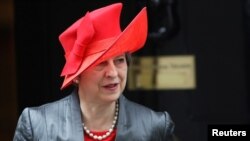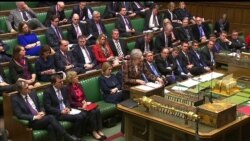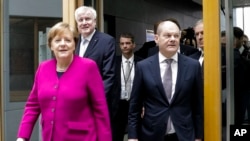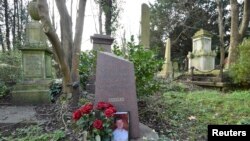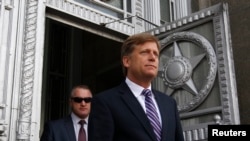British Prime Minister Theresa May said Monday a “military-grade nerve agent” known to have been developed by Russia was used to poison former Russian spy Sergei Skripal and that her government has concluded it is “highly likely” Moscow was responsible.
May told a somber and packed House of Commons there were only two explanations for what happened when Skripal and his daughter Yulia were found slumped unconscious in a town in southern England on March 4.
“Either this was a direct act by the Russian state against our country or the Russian government lost control of this catastrophically damaging nerve agent and allowed it to get into the hands of others,” she said. Britain has given the Kremlin two days to respond.
The British prime minister identified the nerve agent as Novichok (which means newcomer in Russian). It is known to be more powerful than VX and was developed in Russia in the 1970s and 1980s. May had been expected to unveil a raft of initial retaliatory measures against Russia, but told parliament her government would wait until it had received an explanation from Moscow. The Russian ambassador, Alexander Vladimirovich Yakovenko, was summoned to Britain's Foreign Office and told by Foreign Secretary Boris Johnson that the Kremlin had until Tuesday afternoon to respond and explain how a nerve agent the Russians developed and only they possess was used in an attack in Britain.
May’s statement marks a sharp escalation in an unfolding diplomatic and political crisis that is plunging relations between Britain and Russia to their lowest point since the Cold War. Some analysts are likening it to 1971, when Britain expelled 90 Russian diplomats for spying activities.
WATCH: May on what happened to Skripal
“This attempted murder using a weapons-grade nerve agent in a British town was not just a crime against the Skripals, it was an indiscriminate and reckless act against the United Kingdom, putting the lives of innocent civilians at risk," May told parliament. “We will not tolerate such a brazen attempt to murder innocent civilians on our soil."
Sergei Skripal and his 33-year-old daughter remain in critical condition.
Just before May spoke, Russian President Vladimir Putin brushed off suggestions of Kremlin involvement in the poisoning of Skripal, a Russian military intelligence colonel who was recruited as a double agent by Britain’s MI6 and freed by Russia in a spy swap in 2010.
The Russian leader told a BBC journalist during an election trip to southern Russia that Britain needs to complete a proper investigation.
“Sort this out for yourselves first, then come talk to us,” he said.
His spokesman, Dmitry Peskov, said Moscow had nothing to do with the poisoning.
“The incident occurred in British territory. By all means, this is not an affair that concerns Russia, let alone Russia’s leadership,” he said. Russian state television presenters have been blaming the British for the poisoning, arguing Britain wants to fuel ‘Russophobia’ and create a pretext for a boycott of the World Cup, which is being held in Russia later this year.
The Russian embassy said Britain was “playing a dangerous game” and warned of serious repercussions.
British officials say they are encouraging NATO allies, including the United States, to agree to a coordinated response, depending on Russia’s response. French President Emmanuel Macron and German Chancellor Angela Merkel reportedly are sympathetic and have agreed to act in concert.
The chairman of the British parliament’s foreign affairs committee, Tom Tugendhat, said earlier it would be more effective if other countries joined with retaliatory action.
“If we could bring others with us, that would make a very big difference,” he said.
A former director of policy planning for NATO, Fabrice Pothier, warned Monday that Britain may face problems in persuading NATO’s European members to join in serious coordinated action, highlighting their frustration with Britain over Brexit.
“There is little appetite to help the U.K. and little appetite for more sanctions on Russia,” he told Britain’s Sky News. “The question is whether she [Theresa May] will be able to rally her NATO European counterparts around more sanctions and this isn’t going to be easy.”
Before her statement to the House of Commons, May chaired a meeting of the country’s National Security Council, bringing together senior ministers with top intelligence and security officials. They received a report from toxicologists at Porton Down, Britain’s weapons research facility, about the poison used.
The foreign and defense ministers, Boris Johnson and Gavin Williamson, have been campaigning semi-publicly the past few days for the adoption of a much tougher approach toward Russia than was pursued after the fatal poisoning in 2006 of another former Russian spy, the dissident Alexander Litvinenko.
He died after drinking tea laced with radioactive polonium-210.
Four Russian diplomats were expelled in 2007 by Britain over Russian obstructionism in Britain’s efforts to investigate the assassination. Putin retaliated by expelling four British diplomats. After a public inquiry concluded in 2010 that Litvinenko’s murder very probably had been Kremlin-sanctioned, Britain remonstrated with Russian and froze the assets of two Russian suspects.
The response was dubbed inadequate by Litvinenko’s widow, Marina - a view that has become increasingly shared the past week by British lawmakers, who say a more muscular approach by Britain may have deterred the poisoning of the Skripals.
Local anger in Salisbury mounted Monday after British officials warned that traces of the nerve agent used had been found in a pub and restaurant the Skripals visited. Their advice to hundreds of people who visited the same places to wash their clothes is triggering accusations of a laggardly official response.
British officials say any sanctions that Britain imposes will aim to punish the inner circle around Putin and Kremlin-tied oligarchs, who have bought property in London, educate their children in Britain’s private schools and use the British capital’s finances houses and banks to shield their money and move it around the world.
Analysts say they doubt British retaliation will damage Putin in the Russian presidential election being held on Sunday. The election has been one devoid of suspense with Putin’s victory seen as inevitable. The Kremlin, though, has worried about voter apathy and been determined to secure a strong turnout to demonstrate his popularity and legitimacy, say Russia watchers.Putin's popularity in Russia has often surged when the Kremlin has been in conflict with the West.
Former U.S. Ambassador to Russia Michael McFaul said the fact Novichok was used suggested the Kremlin wanted people to understand the poisoning was state-sanctioned.
He tweeted: “Putin & his agents used on purpose military grade nerve agent to try to assassinate Skripal make sure we all knew who did it. He is taunting us, daring us to do nothing.” The agent is banned under the international convention on chemical weapons.
Novichok works like all nerve agents, overriding neurotransmitters in the body and shutting down the body with death coming from heart failure or suffocation. Made of two relatively harmless materials, it turns toxic when mixed.




